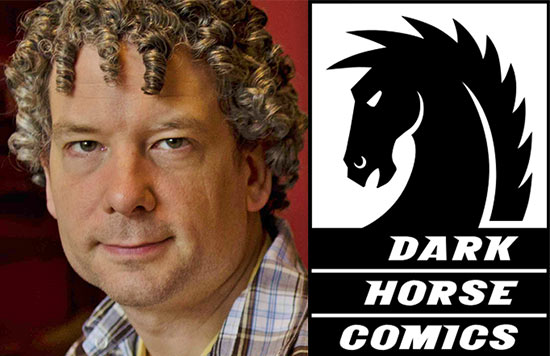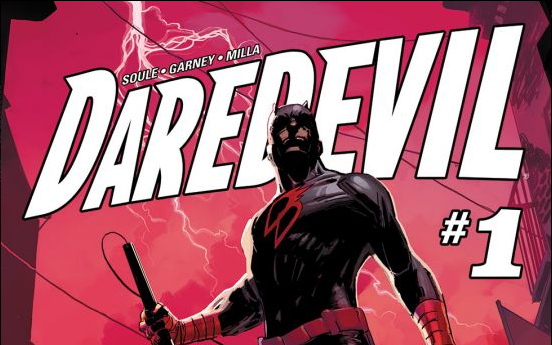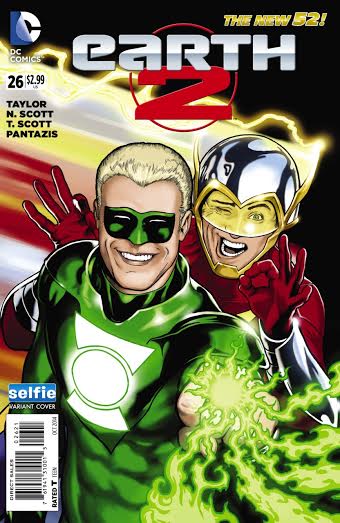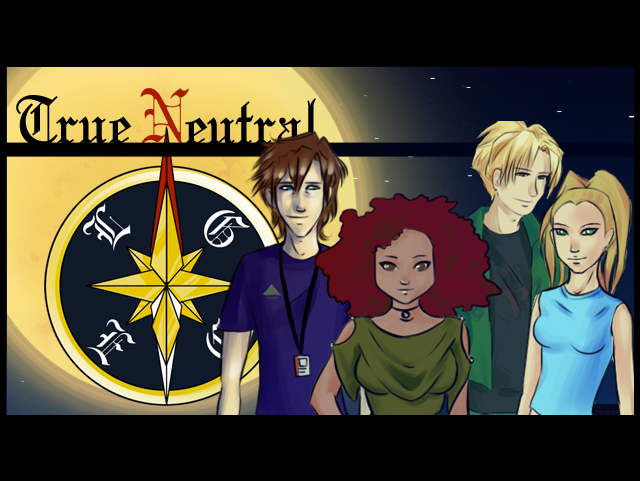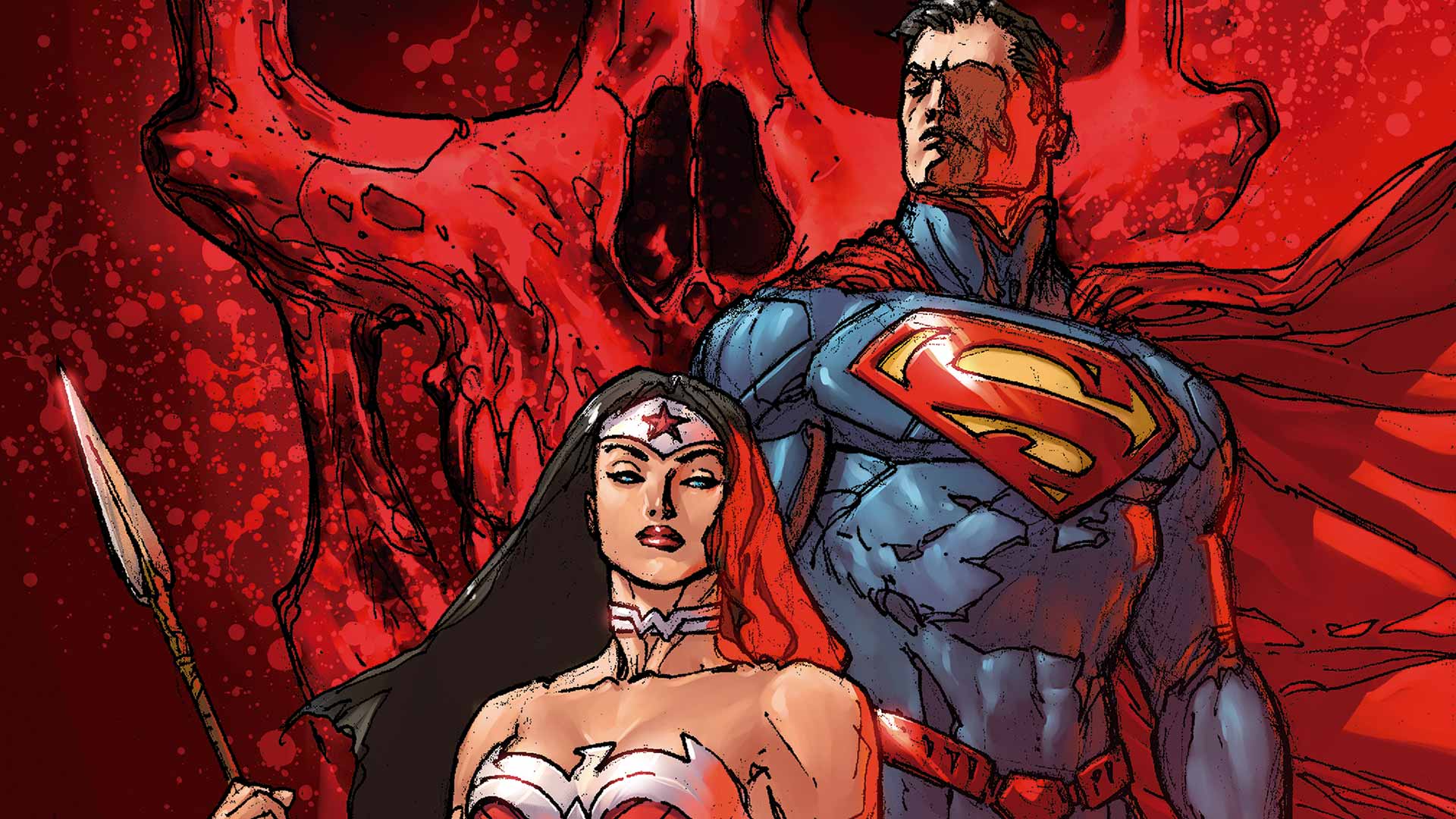As Editor in Chief of Dark Horse Comics and current lead writer of Abe Sapien with Hellboy creator Mike Mignola, to say Scott Allie stays busy is an understatement. Luckily, he was able to spare The Geek Initiative a few moments of time to talk about women in comics, the industry as a whole, and offers some advice for aspiring comic book creators.
Since The Geek Initiative is all about celebrating women in geek culture, were there any female roles models you had growing up? Do you have any now?
Because of my parents, and how their divorce went down, I was used to looking to women for guidance and leadership from an early age. It was a female reporter for our local paper who first singled me out, when I was in fifth grade, and encouraged me to pursue writing, though at the time the message was no more specific than that. I don’t even remember her name now, unfortunately, but I’ll never forget what she did for me. My first and most indelible artistic role model/nemesis came when I worked for Julie Taymor, who’d go on to direct The Lion King for Broadway and some amazing films, as well as the universally reviled Spider-Man Broadway show. She worked us like animals, everyone on the crew had a breakdown at one point or another—I was fifteen years old—but she’s a visionary, and I learned a little something about creative obsession by being in her shadow that summer.
One of the most important women in my early life was and remains Rebecca Guay. We were friends in high school, in our shadowed little town, and we obsessed about comics and art while running around this colonial graveyard. She was a much more devout artist than I was—this lithe little girl whose right hand was hard as rock at age fifteen because she’d already been gripping a pencil so firmly for so long. More recently she created something called Illustrators Master Class, an immersive art experience in Western Massachusetts every summer. I’m part time faculty on that, so Becca continues to give me some of the most rewarding creative experiences of my life, being among an amazing faculty she’s gathered including Mignola, Boris Vallejo and Julie Bell, Dan Dos Santos, the great art director Irene Gallo, and a bunch of other people who inspire me.
My first job, I was the only guy there. I worked for Glimmer Train Press, a literary magazine in Portland, run by two sisters. When I was on staff the only other employee was a woman, who mostly did data entry. It was an ideal work environment. I still work for them on a freelance basis, doing copy editing, and what they’ve done with the book really inspires me. I was lucky to get that as my first job out of college.
And daily, now, I’m guided and inspired by my wife, Elisabeth. We were talking to a young woman at a big family gathering—but a woman we’d never met before—about comics, and she said to Elisabeth, “It’s nice that you’re familiar with what he does for work.” We just kind of laughed, because Elisabeth knows more about some aspects of comics than I do, and she was into it at as early an age as I was. And Elisabeth is a great writer, and a much cooler head—or rather, I guess, she’s a cooler head about things I get worked up about, just as I can stay cool about the things she gets mad about. So I can process a lot with her.
Thanks to my mom, I’ve always sought balance and guidance from women, and because of Rebecca and I suppose Julie, I’ve always seen women as part of this creative endeavor—I never had it in my head that women weren’t right in the center of comics. When I had to do a paper on the comics business in college, it was Cat Yronwode and Karen Berger who got back to me. As a dopey college kid I spent an hour on the phone with Karen quizzing her on the business. She was running Vertigo. One of her male counterparts at the time, I couldn’t even get him to respond to me. Does that surprise anyone?
I’m happy to have hired some great women at Dark Horse—Sierra Hahn, Rachel Edidin, Shantel LaRocque, and more—and they, and my other female coworkers like Cara Niece and Freddye Miller, have been some of my most important sounding boards and checks. “Check your privilege”?—I try, and I count on some of them to help me do it. There’s a writing project I have, a personal thing, where I’m exploring why it’s been easier finding trust and guidance in female peers than the male ones.
Two of the most important voices in my professional career have been Christine Mignola and Kelly Sue DeConnick. When I was in my twenties I thought of Christine as my favorite adult. Now I consider myself an adult, at last, and she remains one of the people I trust the most in the world. She’s always the smartest person in any room. She’s provided me the most guidance of anyone in my professional life, I think. And Kelly—one of the greatest experiences in my career in the last few years was running the Prometheus: Fire and Stone writers team with her. We’d been friends a while, and this is the only thing we’ve worked on, and it’s great to have someone you trust that you can lean on like that, step back and daydream while they lead you forward.
If you’d just asked me about role models, or people who’ve guided me one way or another, regardless of gender, I’d have thrown in Mike Mignola, Joss Whedon, Chuck Palahniuk, a college professor and a high school teacher, a couple guys from Dark Horse, but any list of people in real life who’ve shaped me would’ve been dominated by women. I’m not saying that I haven’t experienced comics as a boys club, because certainly it’s that, and it has been that, but I’ve been able to experience a very different side of it too.
Similarly, do you have any favorite female comic book heroes?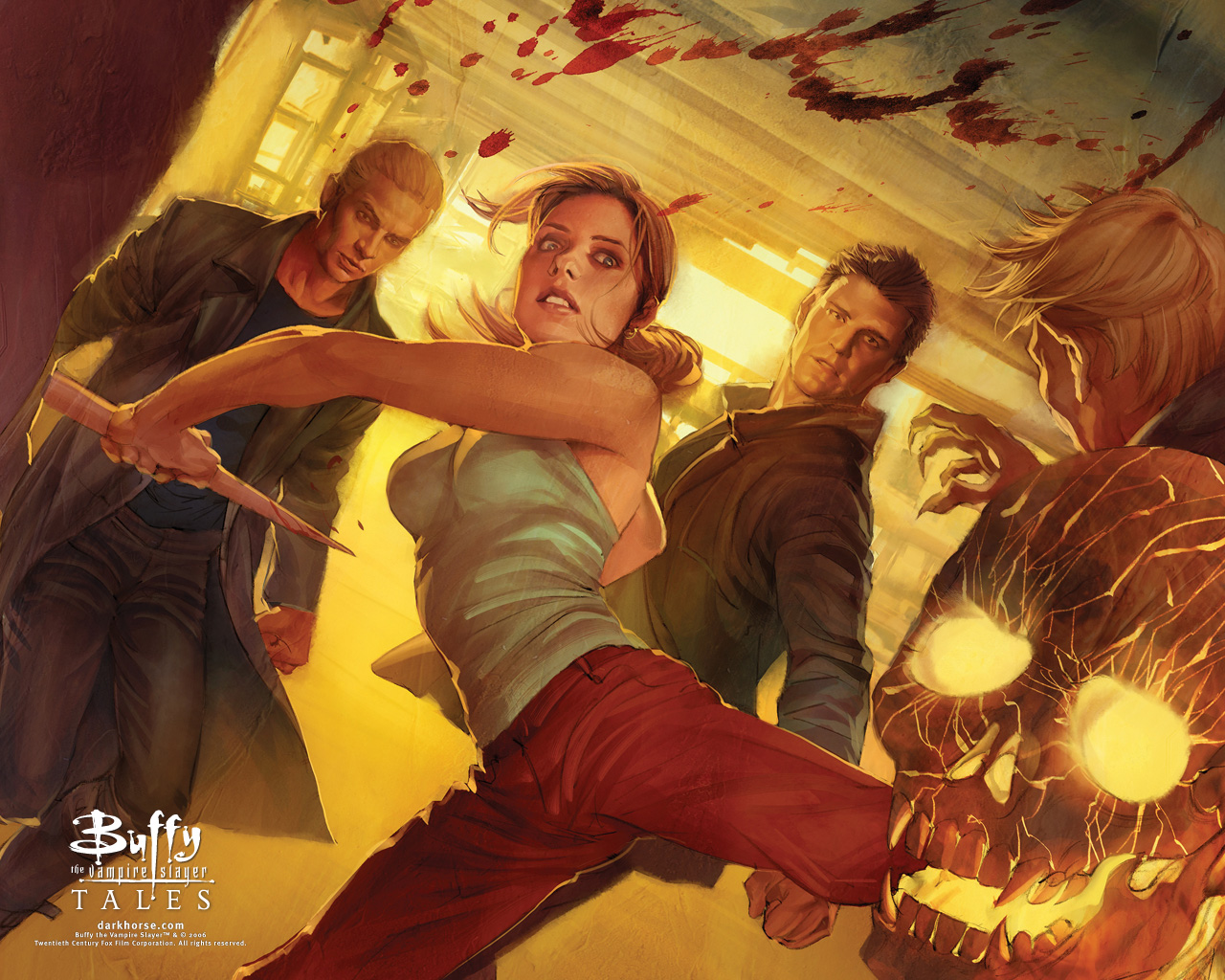
Not as much, but I don’t have a list of comic book heroes … I never think about favorite characters, although I know that’s a big part of how readers look at comics. My favorite female characters are Buffy, Liz Sherman, Marla Singer, and Kate Corrigan. Josie Schuller. Deena Pilgrim. Dana Cypress. Suzie from Sex Criminals. Forever Carlyle.
How have you seen the comic industry become more inclusive in recent years?
Things have definitely opened up. A couple years ago one of the Big Two had literally one woman working in a key creative role, I believe. Last week the New York Times list of graphic novels was dominated by books by and about women. Folks like Kelly Sue DeConnick, Fiona Staples, Becky Cloonan, Gail Simone, Alex De Campi, Corinna Bechko, Jillian Tamaki, and so many others are doing work that’s defining the direction of the industry—the same way Diana Schutz, Cat Yronwode, and Karen Berger have done in the past. I think you can see the progress, enough that it scares the right people.
But change is coming slowly, and there’s not enough of it. There are a lot of voices not being heard. Comics has been good at welcoming female and LGBT voices, though we haven’t achieved anything approaching parity—and we haven’t seen the same growth in racial minorities. For me personally, the situation regarding women and LGBT has been more apparent, more a part of my life. My own background doesn’t give me as useful a point of view on that end of things, and I’m not really an activist. I mostly just think about making the best books I can, and the bulk of my energy goes there, but I try to do more, for my part, for diversity.
Dark Horse just partnered with Comixology (which is awesome!), do you think digital comic books are allowing the medium to reach more people?
Absolutely! I’m very excited about Comixology. It’s been great so far. I expect big things. I love comics shops, when I do my job I’m thinking about comics shops—I’m told I need to think more about bookstores and digital, but just like the previous question, you’re shaped by your experiences, and I’m shaped by the direct market. But I believe digital helps us reach a lot of people who’ve lapsed, or never dived all the way into their comics habit because the direct market didn’t fulfill their needs. And I don’t think digital and the direct market are mutually exclusive. There will be customers who get different things out of the different markets. But certainly we live in an age where the consumer expects the product to come to her, and digital can do that in unique ways that’ll be great for readers.
Dark Horse publishes a lot of unique stories, how does that shape what you look for in content and the things you write?
I dunno, all stories should be unique, right? It does shape how I look at it, how we look at it. Dark Horse doesn’t have a monolithic approach, the editors have a lot of autonomy to approach this question differently. Because we don’t have a giant superhero hole we’re trying to fill, because we don’t have one genre or one kind of comic to put all our attention on—any original project needs to live or die on its own merits. I actually had a coworker pitch me on something saying, in short, that the best thing about it was that it was a great new horror comic from Dark Horse. As much as I love horror comics—specifically those from Dark Horse, of course—a book can’t stand on that … everything needs to be specific and unique unto itself. Lady Killer is my favorite example right now. There is no other book like this, and no one but Joelle could have done it. It’s not “a violent book with a female protagonist.” It’s so much more than that. Maybe if you’re at Marvel you can say, “It’s another book with a dude in a cape who met Spider-Man.” “It’s a book about a mutant”—SOLD. But Lady Killer, or That Damned Band, or Rebels, these have to be one-of-a-kinds. And this is true of anything—I didn’t mean what I said about mutants or Spidey’s amazing friends. The entertainment world is too crowded, the comics market is too crowded. All stories need to be unique. You can’t look to fill genre niches, you can’t try to repeat successes by copying formulas—you need to have new ideas, try new things, come up with something no one has ever seen before, at least not done like this. We don’t need another Breaking Bad. We need another Breaking Bad.
What’s it like writing Abe Sabien and contributing to the Hellboy and B.P.R.D universes?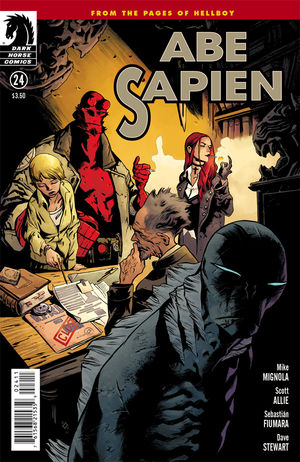 It’s fantastic. It’s everything I could want in comics, honestly. In 1993, a year before I got the job at Dark Horse, right before I started self-publishing my first horror comic, I went to a con in Portland. Dark Horse was rolling out Legend, if you remember that. Mignola was on stage talking about Hellboy. My girlfriend at the time, Amy, she leaned over to me and said, “You should collaborate with that guy.” I laughed. I explained to her who he was, and reminded her who I was, and said, “That’s not how it works.” And a year later I was his editor—rather, he was demanding that I be his editor, after we worked together briefly on something. And fifty years later, or however long it’s been, we’re doing all this. As Ron Perlman once said to me, “Landing this gig, I’m the luckiest guy since Lou Gehrig.”
It’s fantastic. It’s everything I could want in comics, honestly. In 1993, a year before I got the job at Dark Horse, right before I started self-publishing my first horror comic, I went to a con in Portland. Dark Horse was rolling out Legend, if you remember that. Mignola was on stage talking about Hellboy. My girlfriend at the time, Amy, she leaned over to me and said, “You should collaborate with that guy.” I laughed. I explained to her who he was, and reminded her who I was, and said, “That’s not how it works.” And a year later I was his editor—rather, he was demanding that I be his editor, after we worked together briefly on something. And fifty years later, or however long it’s been, we’re doing all this. As Ron Perlman once said to me, “Landing this gig, I’m the luckiest guy since Lou Gehrig.”
Did you see yourself ever working in comics as a kid?
Sort of, but Julie Taymor notwithstanding, I didn’t see a lot of professional artists in my life. I didn’t have examples. Ed Emberley, the children’s book artist, lived in my home town, as did Updike, but I didn’t understand what it meant to work in a given art field. I was so ignorant, when I met Matt Wagner at Brian Hibbs’s store in San Francisco, my first question to him was if he did this for a living. He’d done Mage and Grendel, he was at that time writing and drawing Legends of the Dark Knight, and I think he was doing that one thing with Neil Gaiman right around then, and I said, “Do you do this for a living or do you have another job?” The writers who I knew at that time were all college professors, and I’d never been to a comics convention, so I hadn’t experienced that—an innocent, blissful time … I always saw myself doing comics, but I didn’t have a clear idea of what working in comics might mean.
For a writer or artist looking to get into the comic industry, what’s the best piece of advice you could give them?
Work obsessively. Only try to do this if you’re obsessed. There are much easier ways to make a living. There are easier ways to make a living writing or drawing. Only do comics if you have to do comics, if nothing else would satisfy. And then work your ass off, do not wait until someone is willing to pay you to do it, because frankly the money ain’t so good that it will provide actual motivation. Dave Sim had said that everyone has 300 bad pages in them. He might have been being uncharacteristically generous. Get all the bad pages out of your system as quick as you can by doing them, and then maybe you’ll start coming up why something good.
Are there any Dark Horse titles we should be on the look-out for?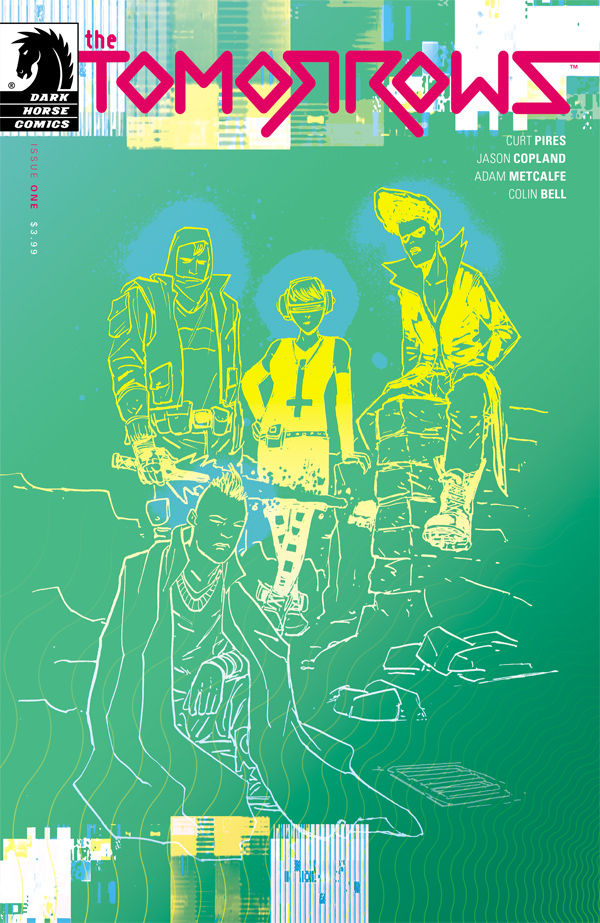
The stuff coming out right now is really exciting for me. The Mignola books are heading into a big, tumultuous time. Fight Club #2 just came out, and that book will get progressively weirder, as Chuck’s novels tend to do. The Goon: Once Upon a Hard Time and Archie Vs. Predator wrap up soon, as well as Mind MGMT; but This Damned Band and The Tomorrows both debut, it’s a busy time.
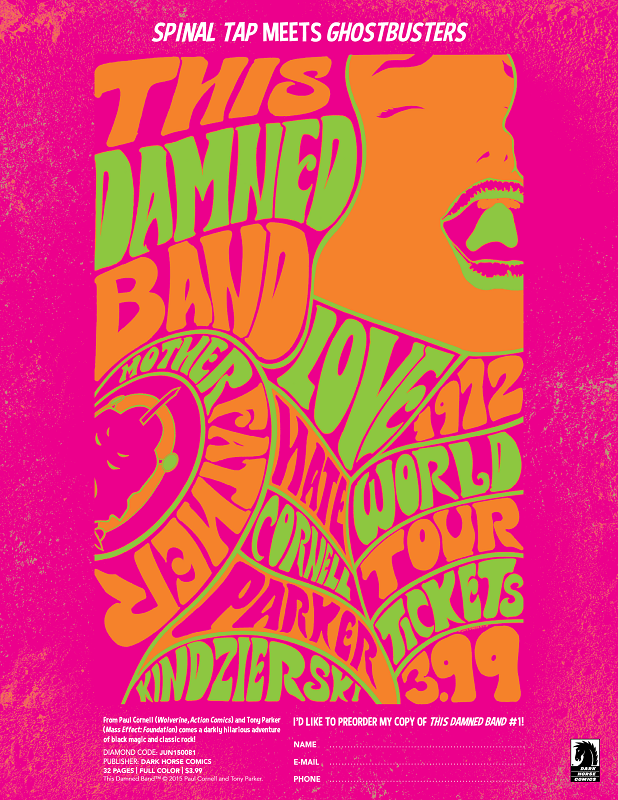
Finally, a fun question, who is your favorite comic book hero and villain, and why?
Hellboy and Antonin Scalia, respectively, because a hero can overcome the fact that he was sent here for nothing but destructive, evil purposes.
Mr. Allie’s ongoing series Abe Sapien continues this month with #25, hitting shelves August 12. More upcoming series from Dark Horse can be seen on their website, http://www.darkhorse.com/ and now Comixology!
*Disclaimer: Interviewer has no material connection to the person or works mentioned in this piece*

